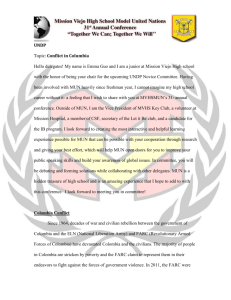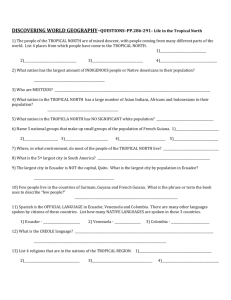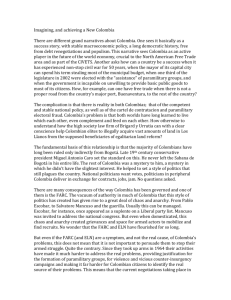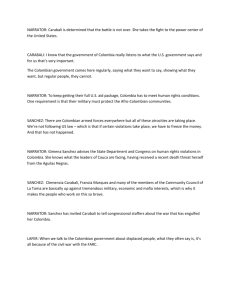The Problem in Context
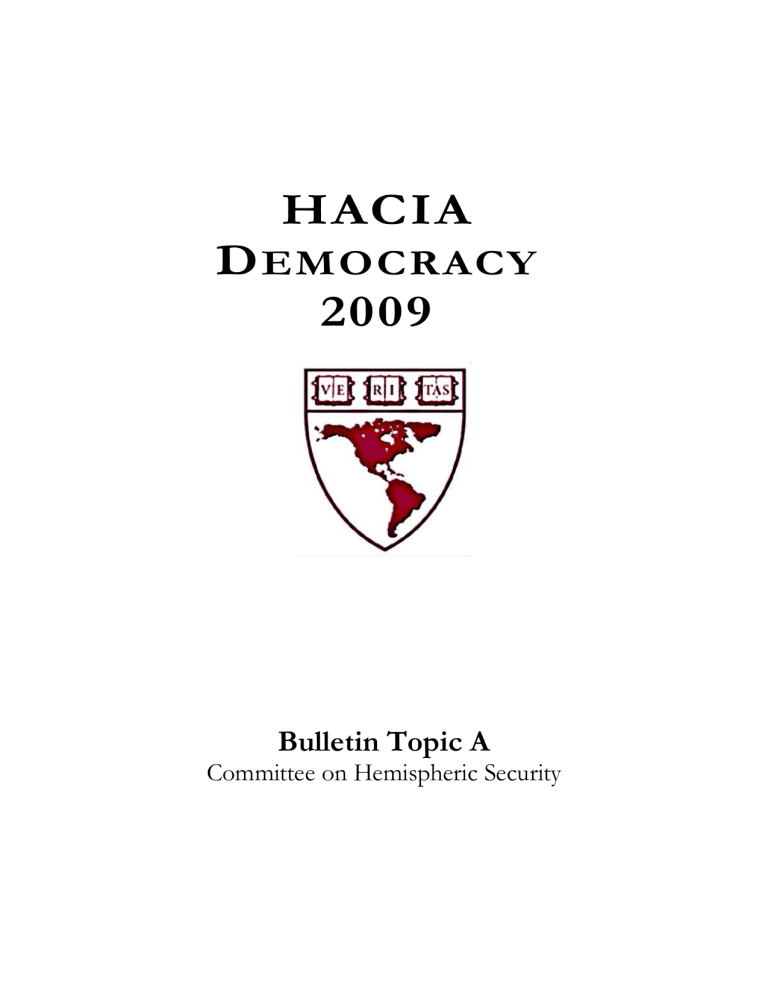
HACIA
D
EMOCRACY
2009
Bulletin Topic A
Committee on Hemispheric Security
Collaboration in the fight for security and interventions
Dear Delegates:
It is with great pleasure that I welcome you to the Committee of Hemispheric
Security. This year we will be discussing the evolution implications of Colombia’s actions in the past March, as they entered Ecuadorian territory in search for FARC rebels. As a product of these actions the hemisphere’s security was compromised as the debate grew to include multiple nations throughout the region. Without a framework or guide line to follow, however, the committee and the OAS was taken aback, and could not address the problem or how to achieve a solution. Fortunately, the debates quieted down after negotiations, and the stability of the region was restored. It is upon you however to make sure that there are regulations, so that if the region’s stability is compromised once again, the committee can take an active role in the proceedings.
I am really excited to take part of this year’s HACIA democracy. Please know that I am available at any time, do not question to send me an email with any questions or concerns to, tperalta@fas.harvard.edu
. I look forward to meeting all of you.
Sincerely,
Tatiana Peralta Quiros
Co-Director
Committee on Hemispheric Security tperalta@fas.harvard.edu
Introduction
Matters of national security in the western hemisphere have, in the past, been dealt with in a very individualistic and segregation matter. The threats of each nation’s concerns cease to become a pressing matter on the international debate table and continue to be dealt with by each nation’s own national regulations.
However, when these problems seem to infiltrate and cross the borders to other nations, there is seemingly no set ruling or notions as to how to deal with such matters, and under which regulations.
The Colombian nations have been dealing with the uprising and violence of the
FARC for several years on a purely national basis. The region seems to be divided on the recognition of such an organization. And therefore, the mayor attempts to fight of a growing violent force have been taken in discretion of the Colombian government.
Nevertheless due to the proximity and difficult border control in the region the
FARC has been setting up camps that do not seem to stay in Colombian soil. Due to the
Colombian’s government policy in working against the violence, this has lead to the infiltration of Colombian military forces in other nations in the region.
In March 2008, in an attempt to find FARC official Raul Reyes, the Colombian military entered Ecuadorian region, in what became one of the most heated debates of
Colombian and Ecuadorian relationships
The problem escalated as other nations, primarily Venezuela, under the mandate of
Hugo Chavez, started to condemn Colombia’s actions and threatened with open warfare in order to defend Ecuador.
The OAS scorned Colombia for the crossing of national sovereignty but, besides that had little influence over the dealings of the region. The Committee of Hemispheric
Security, failed to address the issue properly and, under given mandate, is still lacking true procedure as to a possible security threat in the region.
The Problem in Context
The fight for security in America has usually been reduced to each nation’s borders.
The lack of real conflict that threatens the security of multiple nations in the past years has lead to a scarcity of resolutions regarding the regulations of armed conflict, intervention and diplomacy in the region.
The evolution of the problem
Colombia has had an ongoing problem with the guerilla forces, FARC (Fuerzas
Armadas Revolucionarias de Colombia – Ejército del Pueblo). Although the group, considered to be a terrorist organization by nations such as Colombia and the United States,
has been focused on violence within the Colombian Government, it has certainly leaked to the nations surrounding. The difficulty in securing borders within the regions has lead to the incursion of the FARC in neighboring nations such as, Venezuela, Peru, Ecuador and Brazil.
On Saturday, March 1 st , Colombian troops entered Ecuador on Saturday in a raid that killed Colombian rebel leader Raul Reyes. Colombian President, Alvaro Uribe, stated that they indeed cross the border of Ecuador to a FARC, on the search for Reyes, who was believed to be the No.2 Commander for the FARC troops. The President of Ecuador,
Rafael Correa, was notified beforehand of the raid, and his initial reaction was not one of violence, but more of repression, stating that "Obviously the Ecuadorian airspace was violated ... and not only that but they took away the body of Raul Reyes and left 15 other bodies in the area".
1 There were no threats in his reaction, moreover, Venezuela and
Ecuador, are constantly complaining about the leaking of FARC forces into their regions.
The problem escalated, as the next day, President Uribe announced that it had found documents that linked President Correa to the members of the FARC.
2
President Correa, in response, announced the expulsion of the Colombia’s ambassador in Ecuador. Doing so, he also called for an immediate meeting of the OAS and the Andean Community of Nations. The nations of the region stated to side into different allies, as President Hugo Chavez announced the Venezuela would be closing its embassy in the Colombian capital, Bogota. He also called on his Defense Minister to move battalions to its border with Colombia, in a hostile and unprecedented move. He followed this by saying that, “The air force should mobilize. We do not want war. But we are not going to let them... come and divide and weaken us." 3 Correa rejected a Colombian apology for the cross-border strike as insufficient, and sought to rally opposition during an emergency meeting of the
Organization of American States, convened in Washington to help defuse one of South
America's most volatile crises in years. Venezuela's justice minister declared that war "has already begun." 4
During the next days the problem continued to grow, Ecuador cut all ties with the
Colombian government. The Colombian Government accused President Chavez of supplying $300 million to the FARC forces, and pressed on charges to be made. At this time
Nicaraguan President Daniel Ortega, a former leftist guerrilla fighter, accused Colombia on
Monday of becoming a threat to Latin America by killing a top rebel commander in Ecuador and disputing territory 5
The OAS passed a resolution on the 5 th that confirmed the fact that Colombia had breached national sovereignty as it flew over the Colombian-Ecuadorian border in order to kill national rebels. It stated furthermore that it was confident that these actions were not
1
http://www.reuters.com/article/homepageCrisis/idUSN01226245._CH_.2400
2
http://news.bbc.co.uk/2/hi/americas/7274222.stm
3 http://www.reuters.com/article/worldNews/idUSN0227633020080302?feedType=RSS& feedName=worldNews&rpc=22&sp=true
4
http://www.foxnews.com/story/0,2933,335073,00.html
5 http://www.reuters.com/article/worldNews/idUSN0442071220080304
likely to escalate into much more and therefore, decided to reconvene days later.
6 nations reinstated their ties days later.
The
Previous attempts to address the problem
Due to the fact that the problem did not escalate towards any actual armed conflict and was resolved using diplomacy after this there was no passing of a resolution that acted towards collaboration in the fight for security and intervention in the region. Therefore the mandates continue to be those that ruled before the insurgency of the past March.
Therefore the standing ruling on this matter continues to be, that stated on the Draft
Resolution published by the Committee of Hemispheric Security on 17 May 2006, To reiterate its mandates to the Permanent Council and to the General Secretariat contained in the following resolutions, and to urge member states to continue contributing to the attainment of the objectives established in the following resolutions through the development and execution of activities, the submission of reports, the exchange and sharing of information, the adoption of measures and policies, and cooperation, support and mutual assistance.
Earlier that year, on January, President Hugo Chavez had met with the leaders of
Cuba, Bolivia, Ecuador and Nicaragua to join forces and form something similar to a NATO kind of defense system.
Later on this year, after the incidents that happened in March, the idea was extended to the nations of the region, however, it excluded key members such as the United States.
The Problem Today
The Latin American Executive Committee of the IUF, representing 69 organizations from 17 countries, has been outspoken in its joins clamor of those who are demanding an immediate end to the escalating confrontation in the form of violent words and gestures, and who are calling for multilateral forums to be prioritized as the only scenario and framework for the resolution of the current confrontations. It also reaffirmed its active commitment to defending democracy and pluralism, and to the on going struggle to fully apply and deepen these processes, so that our peoples may live with greater social justice, greater freedom, and greater opportunities for integral development, in a climate of peace and safety.
7
Nowadays, the gap between the political ideologies in the nation seems to keep on growing. Nations, such as Venezula, refuse to convene in defense meetings that would involve the US, following its belief that the US wants to spread violence in the region.
President Uribe, continues to have great problems with dealing with its national violence and the guerilla warfare of the FARC. However, with nations like Ecuador and Correa, unlikely
6
http://www.oas.org/OASpage/press_releases/press_release.asp?sCodigo=E-067/08
7 http://www.rel-uita.org/internacional/declaracion_rel_colombia-ecuador_eng.htm
to help, there are still debates as to weather the dismantling and attempts to reduce the violence of the FARC should be left to Colombia’s hands.
The talks of a South American Security Council have not been continued, and further resolutions regarding the events of March; weather it deals with sanctions against the
Colombian Government because of its infringement of national sovereignty, or to the dealing of the FARC and other organization handling have not been yet passed.
The Crux of the Debate
Ideological conflicts
On March 7, the Rio Group, a collaboration of 21 Latin American countries,
(Argentina, Belize, Bolivia, Brazil, Caricom (Caribbean Community), Chile, Colombia, Costa
Rica, Cuba, Dominican Republic, Ecuador, El Salvador, Guatemala, Guyana, Haiti,
Honduras, Mexico, Nicaragua, Panama, Paraguay, Peru, Uruguay, Venezuela) 8 convened with the issue of the Colombian military incursion at the top of the list for discussion.
President Alvaro Uribe reiterated apologies for the military’s incursion but maintained the claim that although the bombs had landed within Ecuador, the airstrike had taken place from
Colombian airspace.
9 The conference ended with the agreement that the situation would be resolved and diplomatic relations would be restored. As President Uribe and President
Correa shook hands, the entire region saw peace, as this symbolized the nation’s willingness to collaborate and resolve the issues diligently and calmly
Colombia’s ideology in dealing with the FARC forces has been to rely on its military force. This has proved to be a successful strategy, since under President Uribe’s term,
Colombia has been the reduced to more than a half.
10
However, current debates still see a division of ideologies, since, Colombia continues to prioritize above all, bringing an end to the paramilitary groups that continue to bring instability to their nation. Colombia will approve of any resolution that aids in their swift and merciless defeat while consolidating the Colombian government’s power.
Colombia does a great deal of trade within the region and those nations benefitting from this would do well to seek stability in Colombia. A greater peace would bring about a greater prosperity, not just for Colombia, but for the region as a whole. The United States has worked in aiding President Uribe and the Colombian government in order to work against the FARC forces. It continues to maintain very close ties with the Colombian government. Willing collaboration has been necessary for the implementation of Plan
Colombia and the U.S. War on Drugs in the region
Other nations in Latin American nations, guided mostly by the influence of Hugo
Chavez and Venezuela’s power, pose an ideology that stands in opposition to the more
8
http://en.wikipedia.org/wiki/Rio_Group
9
http://news.xinhuanet.com/english/2008-03/08/content_7744566.htm
10 http://en.wikipedia.org/wiki/FARC
conservative government of Colombia. These nations maintain an ideology that sympathizes with the struggle of groups such as the FARC and want to see a resolution that does not involve the use of force against them. They are also likely to reject any resolution that depends on the United States as a mayor aiding and negating mediator in dealing with the security of the nations. These nations have an undeniable need to control what happens in their borders and will not be likely to accept foreign intervention.
The Power of the Committee to Address the Topic
Committee jurisdiction
It is important to remember that the Committee of Hemispherical Security, as a
Permanent Council of the Organization of the American States, has to abide by the regulations it has set forward. This means that is must continue to decide the general action and policy of the represented nations. It must also serve as a discussion in order to strengthen and coordinate cooperation, promote collaboration of the nations, and to adopt general standards of operation.
Any resolution of the Committee of Hemisphere must uphold the principal in
Article 2 of the Charter of the Organization of American States ,"to strengthen the peace and security of the continent." Furthermore, as a council of the OAS, the committee must respect the following articles of Chapter 5 of the OAS charter:
Article 25
The following are peaceful procedures: direct negotiation, good offices, mediation, investigation and conciliation, judicial settlement, arbitration, and those which the parties to the dispute may especially agree upon at any time.
Article 26
In the event that a dispute arises between two or more American States which, in the opinion of one of them, cannot be settled through the usual diplomatic channels, the parties shall agree on some other peaceful procedure that will enable them to reach a solution.
Article 27
A special treaty will establish adequate means for the settlement of disputes and will determine pertinent procedures for each peaceful means such that no dispute between
American States may remain without definitive settlement within a reasonable period of time.
Previous OAS action
Days after the attack on Ecuadorian Soil the OAS convened in a special meeting that brought together all member nations. In this committee the OAS issued a press release that stated that it was wrong of Colombia to enter the territory of Ecuador in such a way.
However it did not give any more than this scorning, as a resolution to all the happenings in
March.
It relied on the representatives of the nations that proclaimed that although three were threats of war, there was no way in which the problem would actually escalate to an open war front between these countries.
Therefore, it decided to reconvene nearly two weeks later in order to reassess the proceedings. When the time for the reconvening came about the uproar had been calmed and the nations have reinstated their talks among each other, averting therefore any further resolutions that the OAS should pass.
Needed collaborators
In order to reach an agreement regarding the collaboration in the fight security and intervention it is imperative to have support of all of the member nations of the OAS.
Clearly, given that this is a measure that should search for the security of all members in the region is should represent all the desires of the nations involved.
Furthermore, it is also of the up-most importance, if there is going to be any convention taken as to the international response to organizations such as the FARC, to have the support of the nations that has taken mayor action and where it is located, in this case, Colombia.
It is also important to have the support of nations like Ecuador that feel that they have been done harm. And, for these nations to realize that measures of the Committee have as an aim to maintain the international security of the region.
It is also important to consider the nations of Brazil, the United States and
Venezuela that have become mayor economical and political forces in the region.
Proposed Solutions
Options, Underlying Philosophy and Likely Impact
After the happenings of March, the region reinstated the negotiations of a South
American Security Council that would act much like NATO. However, it is important to realize that there talks did not involve the US, a nation that is a mayor active member of the
OAS.
Furthermore, it is important to state the regulations that hold when it comes to fighting organizations like the FARC, that do not seem to respect national boundaries.
Under the OAS charter, there should be collaboration amongst the security information of the nations, however, it is important to
If the Committee decides that the actions of the Colombian government were unacceptable, it should refrain from immediate punishment, as the committee does not have the jurisdiction to apply any sort of punishment. However, the committee should attempt to develop a protocol for similar inappropriate action in the future, so that if a conflict like that of March 2008 occurs again, the Organization will be ready to act decisively and with full
preparation. Such a protocol could include military ramifications, economic measures including sanctions, or a variety of other preventative measures. This would at once punish any aggressor, but more importantly, act as a deterrent to such aggression.
Framing Position Papers
Relevant facts about the member country
Colombia- President Uribe seems to continue to be focused on reducing the violence and the power of the FARC over the nation. He has been effective in doing so in his term.
After March, the President came to agreements with the neighboring nations and it has not been reason for international conflict since.
Ecuador- After reaching an agreement with the other nations, President Correa still seems to hold a grudge against the neighboring Colombia. He refused to meet with Uribe in
October stating that, his government would "never forget the aggressions of Colombia." 11
Venezuela- The president of Venezula, Hugo Chavez, has negated all ties to the
FARC. Nevertheless, Chavez has raised difficulties when it comes to dealing with the nations of Colombia and the United States. He did however, accept to the idea of the South
American Security Council
Brazil- Brazil has also suffered from infiltrations of the FARC. As the biggest nation and with huge growth, Brazil is keen on looking for a resolution that will lead to the security of the region. It was Brazilian, Luiz Inacio Lula da Silva, who was among the pioneers in the idea of a South American Security Council
United States of America - The USA has recognized the FARC as a terrorist organization, and has helped to President Alvaro Uribe in its promise to reduce the FARC violence in its nation. However, due to the conflicts between the USA and Venezuela
President Hugo Chavez, talks about security collaboration seem difficult.
Central American Nations- Nicaragua President Daniel Ortega, was the most outspoken during this debacle, giving his support to ally Hugo Chavez. Panama, because of its border with Colombia, feels the presence of the FARC. Other nations seem to want a resolution that will help the collaboration in the fight for security
Caribbean- These nations, much like the nations from Central America, have not been outspoken about the issues, as to taking sides. The presidents of Colombia, Uribe,
Ecuador, Correa, and Venezuela, Chavez, met in the Dominican Republic and upon shaking their hands symbolized the end of the debates
Other South American Nations- the FARC has not only infiltrated the nations of
Venezuela and Ecuador. There is evidence that seems to point to the fact there are FARC
11 http://www.reuters.com/article/latestCrisis/idUSN04370675
presences in other nations such as Peru. These nations have taken part in the discussions of the South American Security Council and most have strong support for the idea.
Ideological concerns and affiliations
The nations of the Western Hemisphere seem to have one mayor deliberate division fueled not by the ideological differences concerning the security of the region but other concerns. Although at the time Colombia, Ecuador and Venezuela seemed to be on completely non-negotiable terms, these nations reinstated their ties merely weeks later
It is the difference between political ideologies of the nations supporting Hugo
Chavez, and the United States that has been a mayor deterrent in passing a resolution unanimously in the OAS.
Negotiable & Non-negotiable positions and policies
The policies set forth in press releases or written documentation about each nation’s policy many not be negotiated as part of the debate
However, because there has not been a clear resolution as to the specific discussion questions that this debate is raising, much is still undecided in regards to each nation’s policy.
It is therefore, important to understand the policy of each nation and how this would reflect unto the matter at hand.
Aims for the session
The aims for this session should be to reach an agreement that will represent the desired of all of the members of the Committee. It is also important to pass a legislature on this matter that seems to have no precedence.
It is therefore important to work within each nation’s policy in order to reach an agreement that will prevent a possible war front like possible war front the region experienced in March.
It is also important to reach an agreement that declares the regulations that should be put forward when organizations seem to intervene in neighboring nations
Questions a Resolution Must Answer
Is the idea of collaboration in the fight for national security a viable idea for the nations of western hemisphere?
In which conditions is it excusable for the nation to breach another’s nation sovereignty and borders in order to resolve matters of national security?
What regulations and penalties, if any, should the Committee on Hemispheric
Security have regarding the matters of interventions?
Should the Committee of Hemispheric Security work together to solve matters of national security, such as the FARC, or should it be left to the discretion of each nations own government?
When and how should the Committee of Hemispheric Security intervene in matters of international security?
Should the committee have a more active role in the events of security and interventions, and if so, how can it achieve this given the regulations of their charter?
Summary and Conclusion
The events that took place on March brought to light discussions that had not been raised in the region. Because of the lack of precedence there was no procedure that the OAS and the Committee on Hemispheric Security could take in order to ensure the stability and security of the region.
After debate, negotiation and compromises, the situation was quelled peacefully, but nevertheless it still served as a reminder to the committee of the lack of substantial resource and procedure regulation in case there was once again a situation such as this.
In general, the situation showed the lack of coordination between South American countries in the fight against rebel and terrorist groups. It also shed light on the conflicting interests of neighboring countries, and how easily these might lead to an armed confrontation. It is therefore this committee’s to answer the still dwelling questions: Under what conditions should armed intervention between countries is permitted? Would these interventions be justified if countries were hosting, deliberately or without knowing, terrorist groups such as the FARC? And, what role does the OAS and specifically the Committee for
Hemispheric Security has in permitting these interventions and/or punishing unjustified interventions?
Suggestions for Further Research
For more research I suggest looking at two primary sources. How has your country dealt with security threats in the past, including international and national threats. This will give insight as to the foreign policy that it might employ when considering the nations subsequent actions to the dealings with Colombia and the rest of the hemispheric nations. I also suggest looking at the influence that the FARC has had over each nation in order to determine, more specifically, your nation’s position to the specifics about this debate.
The OAS website on press releases and other information
( http://www.oas.org/communication/english/publicinformation.asp
) and the website for the Committee on Hemispheric Security Key ( http://www.oas.org/CSH/english/ ) also provide lots of resources regarding the policy of the nations. I also recommend looking at past resolutions and draft resolutions listed in the previous website.
As to the current documentation on the topic at hand I believe that your greatest resource will be the OAS Security Documents
( http://www.oas.org/csh/docs/Documentos%20Claves.pdf
), which provide a complied version of all the resolutions that have been passed that deal with the Security of the
Hemisphere.
